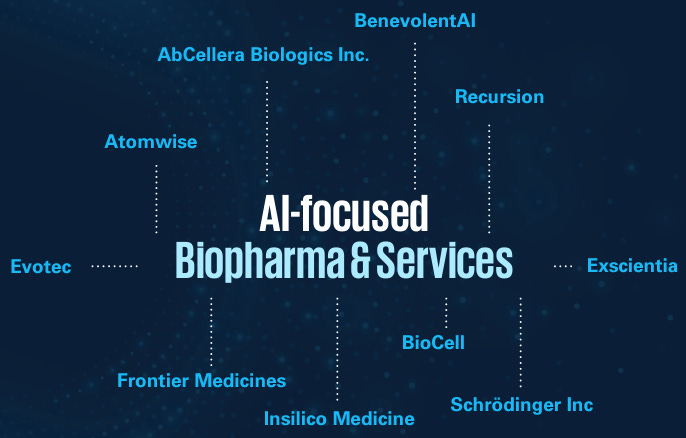The Impact of Artificial Intelligence on the Biotech and Biopharma Industry
Drugs in clinical trials and market analysis of Exscientia, Insilico Medicine, BenevolentAI and others.
Artificial Intelligence (AI) is revolutionizing the biotech and biopharma industries by accelerating innovation, streamlining processes, and eliminating barriers. This transformation is driven by AI's ability to aggregate and synthesize vast amounts of data, and therefore enhancing efficiencies, powering new products and services, and enabling novel business models. Here I discuss the impact of AI on the biopharma value chain, highlights specific drugs identified by AI that have entered clinical trials, and provide a market analysis of companies involved in these advancements.
AI’s Impact on the Biopharma Value Chain
R&D
AI is significantly transforming the research and discovery phase of drug development. By leveraging machine learning and natural language processing, AI can analyze vast datasets to identify potential drug targets and predict the efficacy of new compounds. For instance, AI-driven platforms like Exscientia and Insilico Medicine have developed algorithms that can design new molecules and predict their interactions with biological targets (1).
Clinical Development
AI is also making strides in clinical development by optimizing trial design, patient recruitment, and data analysis. AI tools can identify ideal trial sites, optimize eligibility criteria, and predict trial outcomes, thereby increasing the efficiency and success rates of clinical trials (2). For example, Insilico Medicine’s AI-designed drug for idiopathic pulmonary fibrosis has shown promising results in Phase 1 trials and is now progressing to Phase 2 (1).
Manufacturing and Supply Chain
AI-driven automation is revolutionizing the manufacturing and supply chain processes in biopharma. AI-enabled bots can perform repetitive tasks faster, cheaper, and more accurately than humans, allowing employees to focus on higher-value activities (3). This not only enhances productivity but also reduces costs and minimizes errors.
Commercial Operations
In commercial operations, AI is being used to enhance marketing strategies, optimize sales, and improve customer engagement. AI tools can analyze market trends, customer behavior, and sales data to develop targeted marketing campaigns and personalized customer experiences (4).
AI-Identified Drugs in Clinical Trials
Several AI-identified drugs have entered clinical trials, which is very exciting. This shows the potential of AI in drug discovery and development.
Exscientia, a leader in AI-driven drug discovery
Exscientia (EXAI) is a leading company in AI-driven drug discovery and has several promising clinical trials that are attracting significant attention.
In 2022, EXS-01, developed in collaboration with Sumitomo Dainippon Pharma (DNPUF), targets obsessive compulsive disorder and has entered Phase 1 clinical trials. The candidate was brought to clinical trials in just 12 months, significantly faster than the industry average. Since the initial announcement, however, there seems to be limited publicly available information, likely because the trial or the analysis of trial results is still ongoing.
In collaboration with Evotec (EVO), Exscientia developed EXS21546, a highly selective A2A receptor antagonist. This small molecule has entered Phase 1b/2 trials for patients with solid tumors carrying high adenosine signatures (1). Adenosine A2A receptor antagonists have been active in animal models of anxiety, depression, and reduced cognition, and may also be effective in controlling nonmotor symptoms of Parkinson’s disease.
Bristol Myers Squibb (BMY) and Exscientia developed EXS4318 (5) that entered Phase 1 trials in 2023. EXS4318 is a potent, and selective inhibitor of protein kinase C-theta, a key driver of several autoimmune diseases, such as rheumatoid arthritis, psoriasis, inflammatory bowel diseases, asthma, type 1 diabetes, and multiple sclerosis. I think this drug has decent potential to become an anti-inflammatory drug with widespread use, but we will have to wait for updates from the ongoing trials.
Another collaboration with Sumitomo Dainippon, EXS-17 is aimed at treating psychosis associated with Alzheimer’s disease. The candidate began Phase 1 trials last year, marking a significant step in addressing neuropsychiatric symptoms in Alzheimer’s patients.
Lastly, EXS617, a CDK7 inhibitor that is aimed to disrupt tumor growth is currently in Phase 1/2 clinical trials. It targets CDK7, an enzyme involved in cell cycle progression and gene transcription. One potential benefit is that it could overcome limitations of existing CDK4/6 inhibitors by targeting a different part of the cell cycle (such as Ibrance marketed by Pfizer used in the treatment of hormone receptor-positive (HR+), human epidermal growth factor receptor 2-negative (HER2-) advanced or metastatic breast cancer).
INS018_055 by Insilico Medicine
Insilico Medicine’s AI-designed drug, INS018_055, targets idiopathic pulmonary fibrosis (IPF). The drug has completed Phase 1 trials and is progressing to Phase 2. This drug was developed using Insilico’s proprietary AI platforms, which identified a novel target and a small molecule inhibitor (1).
Insilico Medicine is also developing a USP1 inhibitor for the treatment of solid tumors. This drug has recently received FDA approval to initiate clinical trials (5). Other promising areas of focus for Insilico Medicine include aging and age-related diseases as well as neurological disorders. Definitely a company to keep an eye out for in the future.
BenevolentAI
BEN-8744 is currently in Phase 1 clinical trials and has the potential to be a first-in-class treatment for moderate to severe ulcerative colitis. BEN-28010 is being developed in collaboration with AstraZeneca for the treatment of glioblastoma multiforme and other solid tumors, currently entering Phase 1 clinical trials. It represents a significant advancement in oncology, targeting aggressive and hard-to-treat cancers with a novel approach (6).
Market Analysis of AI-Driven Biopharma Companies
Market Growth
The market for AI in the biopharma industry is experiencing rapid growth. According to MarketsandMarkets, the market is expected to increase from $198.3 million in 2018 to $3.88 billion by 2025, with a compound annual growth rate of 52.9% (7).
Several companies are leading the charge in AI-driven drug discovery and development.
Exscientia
Exscientia is a pioneer in AI-driven drug discovery, with several AI-designed drugs in clinical trials. The company has partnered with major biopharma companies like Sumitomo Dainippon Pharma, Roche, Merck, Bristol Myers Squibb, Sanofi, Bill & Melinda Gates Foundation, Charité Universitätsmedizin Berlin, Rallybio, and GT Apeiron Therapeutics to develop new drugs (8, 9). While I think this company has potential, there are a few challenges the company has faced in the past couple of months resulting in a volatile share price. For example, several class action lawsuits that claim that the company misled shareholders, potentially impacting investor confidence and contributing to the stock price drop. Their financial metrics such as earnings per share and revenue have not consistently met analyst expectations. And finally, the company has also experienced internal issues, including the firing of the CEO, Andrew Hopkins, due to inappropriate behavior.
Insilico Medicine
Insilico Medicine is another key player, known for its end-to-end AI platform for drug discovery. The company has developed multiple AI-designed drugs, including INS018_055 for IPF and a USP1 inhibitor for solid tumors (1). This is a very zoung company, currently not publicly traded. But as of April 2024, the company has completed an initial filing for a Hong Kong IPO, so stay tuned.
BenevolentAI
BenevolentAI (BAI) focuses on using AI to identify new drug targets and develop new therapies. The company has a robust pipeline of AI-designed drugs and has partnered with several major biopharma companies (8). As of mid-July 2024, BenevolentAI’s stock is trading at around $0.65, reflecting a significant decline from its 52-week high of $2.95. BenevolentAI is also facing class action lawsuits and frequent leadership changes have added to the uncertainty around the company’s strategic direction and stability.
Other companies to look out for
Other biotech AI companies that have AI-identified drugs in clinical trials, including Recursion Pharmaceuticals (RXRX) and Schrödinger (SDGR). Recursion has four candidates in clinical trials, focusing on treatments for rare diseases and other complex conditions. Schrödinger has several drug candidates in clinical trials, including those targeting cancer and autoimmune diseases.
Source: © 2023 KPMG LLC
Investment Trends
Investment flows in AI-driven biopharma companies have been substantial, with significant concentration of funding towards a small number of high-valuation players. Over half of the capital invested in this space is concentrated in ten companies, primarily based in the US and the UK (10).
Biotech AI companies have faced challenges, including initial skepticism by investors regarding reliability and interpretability of AI in drug discovery. Regulatory hurdles also pose a challenge, as demonstrating the safety and efficacy of AI-designed drugs to regulatory bodies such as the FDA involves rigorous and lengthy processes.
DISCLAIMER: This content is for informational purposes only. It should not be taken as legal, tax, investment, financial, or other advice. The views expressed here are my own and do not reflect the opinions of any company or institution.
DISCLOSURE: I have no business relationships with any company mentioned in this article.








In the field of biopharmaceuticals, artificial intelligence (AI) has become a mature and well-developed tool. However, since the application of AI is primarily focused on the research and development stage rather than downstream commercial operations, there are still significant opportunities for further integration. Meanwhile, many companies are actively exploring how to layer generative AI, including large language models (LLMs) like OpenAI's ChatGPT, on top of existing data and AI models to further improve the new drug development process and enhance operational efficiency.